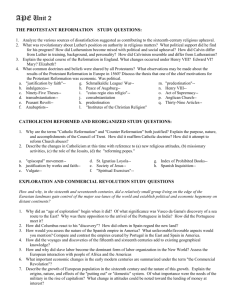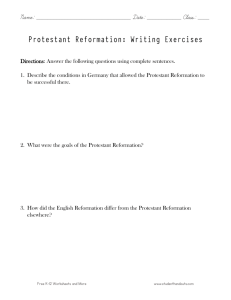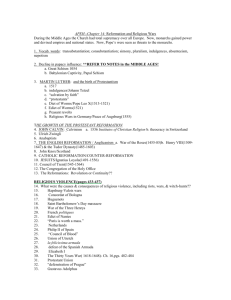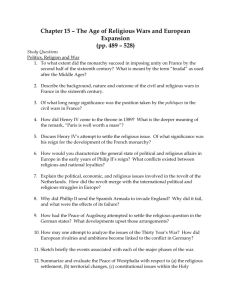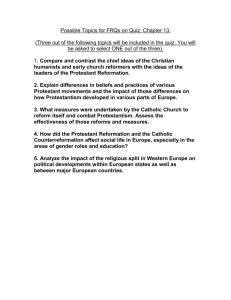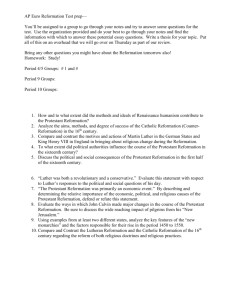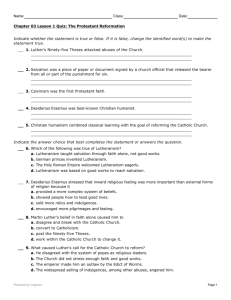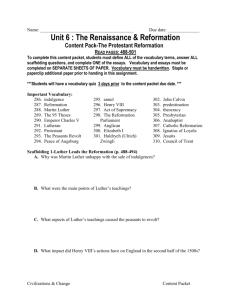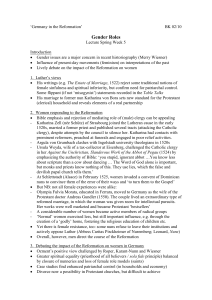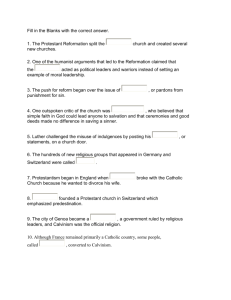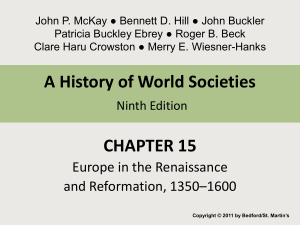the protestant reformation
advertisement
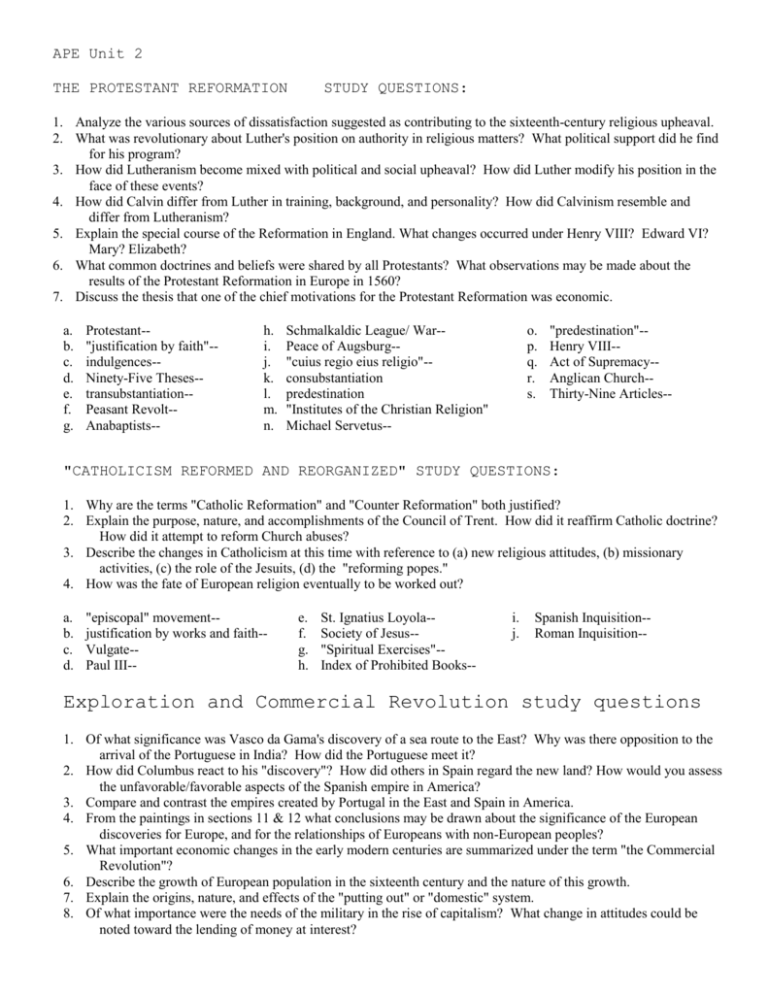
APE Unit 2 THE PROTESTANT REFORMATION STUDY QUESTIONS: 1. Analyze the various sources of dissatisfaction suggested as contributing to the sixteenth-century religious upheaval. 2. What was revolutionary about Luther's position on authority in religious matters? What political support did he find for his program? 3. How did Lutheranism become mixed with political and social upheaval? How did Luther modify his position in the face of these events? 4. How did Calvin differ from Luther in training, background, and personality? How did Calvinism resemble and differ from Lutheranism? 5. Explain the special course of the Reformation in England. What changes occurred under Henry VIII? Edward VI? Mary? Elizabeth? 6. What common doctrines and beliefs were shared by all Protestants? What observations may be made about the results of the Protestant Reformation in Europe in 1560? 7. Discuss the thesis that one of the chief motivations for the Protestant Reformation was economic. a. b. c. d. e. f. g. Protestant-"justification by faith"-indulgences-Ninety-Five Theses-transubstantiation-Peasant Revolt-Anabaptists-- h. i. j. k. l. m. n. Schmalkaldic League/ War-Peace of Augsburg-"cuius regio eius religio"-consubstantiation predestination "Institutes of the Christian Religion" Michael Servetus-- o. p. q. r. s. "predestination"-Henry VIII-Act of Supremacy-Anglican Church-Thirty-Nine Articles-- "CATHOLICISM REFORMED AND REORGANIZED" STUDY QUESTIONS: 1. Why are the terms "Catholic Reformation" and "Counter Reformation" both justified? 2. Explain the purpose, nature, and accomplishments of the Council of Trent. How did it reaffirm Catholic doctrine? How did it attempt to reform Church abuses? 3. Describe the changes in Catholicism at this time with reference to (a) new religious attitudes, (b) missionary activities, (c) the role of the Jesuits, (d) the "reforming popes." 4. How was the fate of European religion eventually to be worked out? a. b. c. d. "episcopal" movement-justification by works and faith-Vulgate-Paul III-- e. f. g. h. St. Ignatius Loyola-Society of Jesus-"Spiritual Exercises"-Index of Prohibited Books-- i. j. Spanish Inquisition-Roman Inquisition-- Exploration and Commercial Revolution study questions 1. Of what significance was Vasco da Gama's discovery of a sea route to the East? Why was there opposition to the arrival of the Portuguese in India? How did the Portuguese meet it? 2. How did Columbus react to his "discovery"? How did others in Spain regard the new land? How would you assess the unfavorable/favorable aspects of the Spanish empire in America? 3. Compare and contrast the empires created by Portugal in the East and Spain in America. 4. From the paintings in sections 11 & 12 what conclusions may be drawn about the significance of the European discoveries for Europe, and for the relationships of Europeans with non-European peoples? 5. What important economic changes in the early modern centuries are summarized under the term "the Commercial Revolution"? 6. Describe the growth of European population in the sixteenth century and the nature of this growth. 7. Explain the origins, nature, and effects of the "putting out" or "domestic" system. 8. Of what importance were the needs of the military in the rise of capitalism? What change in attitudes could be noted toward the lending of money at interest? 9. Explain the general nature and purpose of mercantilism, citing examples of mercantilist policies and regulations. What comparison may be made between mercantilism and the New Monarchies? 10. What effect did the economic changes of the 16th century have upon each of the new Monarchies? 11. What accounted for the new demand for education? 12. Why did the economic changes of these years affect the rural classes of eastern Europe and of western Europe differently? With what consequences? 1. 2. 3. 4. 5. 6. 7. 8. 9. da Gama St. Francis Xavier Magellan "planting" Treaty of 1494 conquistadores Black Legend viceroyalty encomienda 10. 11. 12. 13. 14. 15. 16. 17. 18. mestizos Potosi price revolution guild entrepreneur Medici Fugger usury commercial capitalism 19. 20. 21. 22. 23. 24. 25. 26. 27. mercantilism favorable balance of trade Statute of Artificers of 1563 national vs. internal tariffs chartered trading companies yeomanry Poor Law of 1601 bourgeois robot Wars of Religion 1. How would you describe and characterize the general state of political and religious affairs in Europe in the first years of Philip's reign? What conflict existed between religious and national loyalties? How permanent were the various triumphs of Philip and of the Catholic cause in the years 1567 to 1572? 2. Explain the political, economic, and religious factors that entered into the revolt of the Netherlands. How did the revolt merge with the international political and religious struggles in Europe? 3. How would you analyze the reasons for Spain's decline? 4. To what extent had the French monarchy succeeded in imposing unity on France by the second half of the sixteenth century? What is meant by the term "feudal" as used after the Middle Ages? 5. Describe the background, nature, and outcome of the civil and religious wars in France in the sixteenth century. 6. Of what long-range significance was the position taken by the "politiques" in the civil wars in France? 7. How did Henry IV come to the throne in 1589? What is the deeper meaning of his reputed remark, "Paris is well worth a Mass"? How did Henry attempt to settle the religious issue? Of what significance was his reign for the development of the French monarchy? 8. How would you assess the objectives and accomplishments of Cardinal Richelieu? 9. How had the Peace of Augsburg attempted to settle the religious question in the German states? What developments upset these arrangements? 10. Analyze the issues of the Thirty Years' War. How did European rivalries and ambitions become linked to the conflict within Germany? 11. Briefly summarize the events associated with each of the major phases of the Thirty Years' War. 12. Summarize and evaluate the various aspects of the Peace of Westphalia under the following headings; (a) religious settlement, (b) territorial changes, (c) constitutional issues within the Holy Roman Empire. Of what significance was the Peace of Westphalia for modern international relations? 13. How would you evaluate the broad significance of the Thirty Years' War and the Peace of Westphalia? What seems to have been the net result of the wars of religion? 1. 2. 3. 4. 5. 6. 7. 8. 9. Escorial Duke of Alva Council of Troubles Lepanto William the Silent Mary Queen of Scots Don Juan Union of Utrecht Sir Francis Drake 10. 11. 12. 13. 14. 15. 16. 17. 18. armada catolica Huguenot Catherine de Medici Guise Admiral de Coligny three Henrys St. Bartholomew's Day Massacre Jean Bodin Edict of Nantes 19. 20. 21. 22. 23. 24. 25. 26. 27. Peace of Alais Ferdinand II Frederick V Protestant Union defenestration of Prague Edict of Restitution Wallenstein Gustavus Adolphus German liberties
